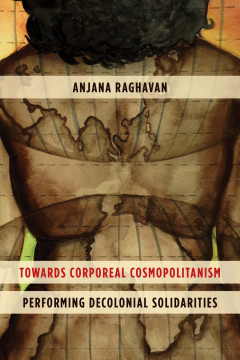
Additional Information
Book Details
Abstract
An articulation of any kind of global understanding of belonging, or ways of cosmopolitan life, requires a constant engagement with vulnerability, especially in a world that is so deeply wounded by subjugation, colonialisms and genocides. And yet discussion of the body, affect and corporeal politics from the margins are noticeably absent from contemporary liberal and Kantian models of cosmopolitan thought.
This book explores the ways in which existing narratives of cosmopolitanism are often organised around European and American discourses of human rights and universalism, which allow little room for the articulation of an affective, embodied and subaltern politics. It brings contemporary understandings of cosmopolitan solidarities into dialogue with the body, affect and the persistent spectre of colonial difference. Race, ethnicity, sexuality and gender are all extremely important to these articulations of cosmopolitan belongings, and we cannot really speak of communities without speaking of embodiment and emotion.
This text envisions new ways of articulating and conceptualising ‘corporeal cosmopolitanism’ which are neither restricted to a purely postcolonial paradigm, nor subjugated by European colonialism and modernity. It challenges the understanding of liberal cosmopolitan solidarities using decolonial, and feminist performances of solidarity as radical compassion, resistance, and love.
Fleshy and affective, Towards Corporeal Cosmopolitanism offers a radical alternative to the disembodied rationalism of liberal cosmopolitanism. Using an approach that is at once decolonial, queer and feminist, Raghavan explores cosmopolitan solidarity in "the global south." It is a key contribution to opening the heart of cosmopolitanism to the corporealised knowledges of those who are violently marginalised and excluded.
Veronique Pin-Fat, Senior Lecturer in International Relations, The University of Manchester
Anjana Raghavan offers an invigorating intervention into contemporary discourses on cosmopolitanism. Moving effortlessly through nuanced critiques of Euro-American philosophy, her efforts re-center embodiment, affect, and emotion as crucial sites of postcolonial epistemology. Corporeal Cosmopolitanism is a compelling and sensuously rendered treatise on decolonial knowledge and radical world-making.
Pavithra Prasad, Assistant Professor, Department of Communication Studies, California State University
Anjana Raghavan is Senior Lecturer in Sociology, Sheffield Hallam University, United Kingdom.
Table of Contents
| Section Title | Page | Action | Price |
|---|---|---|---|
| Towards Corporeal Cosmopolitanism | Cover | ||
| Contents | vii | ||
| Acknowledgements | ix | ||
| Note from the Author | xi | ||
| Introduction: Incanting the Body into the Political | 1 | ||
| 1 Locating Corporeal Cosmopolitanism: Theoretical Vicissitudes | 15 | ||
| Kantian Resonances | 17 | ||
| Mapping Cosmopolitan Belongings | 23 | ||
| Mapping Cosmopolitan Belongings: Is Patriotism a Cosmopolitan Feeling? | 24 | ||
| Mapping Cosmopolitan Belongings: The Case for Cosmopatriotism | 28 | ||
| Mapping Cosmopolitan Belongings: Excising Nation from Cosmos | 34 | ||
| Mapping “Other” Cosmopolitan Belongings | 40 | ||
| 2 The Anatomy of Abjection: Contextualising Exclusion, Corporeality and Emotions | 51 | ||
| The Mechanics of Exclusion | 53 | ||
| Body Stories across Times and Places | 65 | ||
| Body as Verb: Doing Corporeality | 72 | ||
| Corporealising Cosmopolitanism: Possibilities and Inspirations | 79 | ||
| 3 Occluded Rainbows: Queerness and Cosmopolitan Solidarities in India | 87 | ||
| Queer/LGBTQI+: Naming and Organising in India | 94 | ||
| Constitutionality, Legal Reform and Cosmopolitan Solidarity | 97 | ||
| Storytelling and Identity-Making: Mythologies, Cosmologies and Life Stories | 100 | ||
| Thirunangai Representations and Narratives in Tamil Nadu | 105 | ||
| 4 Are Dispossessed Bodies Human? Gender, Exile and Cosmopolitan Solidarities | 121 | ||
| Windflowers: Unrooted Homes and Cosmopolitan Belongings | 123 | ||
| Black Masks; Brown Masks: Ethnic Conflicts in the Caribbean Islands | 127 | ||
| Indo-Caribbean Women: The Marginalisations of Gender and Race | 134 | ||
| Experiential and Literary Tropes in Indo-Caribbean Women’s Identities | 140 | ||
| Writing as Memory, Writing as Healing: Indo-Caribbean Women’s Literature | 146 | ||
| 5 Love in the Time of Corporeal Cosmopolitanism | 157 | ||
| Affect, Eros and Vulnerability: Feeling Cosmopolitanism | 158 | ||
| Cosmopolitanism/Colonialism: The Janus-Faced Nexus | 164 | ||
| Love and Theory in Corporeal Cosmopolitanism | 169 | ||
| Desiring Cosmopolitanisms: Affective and Embodied Solidarities | 175 | ||
| Corporeal Communities: Rituals of Belonging | 182 | ||
| Bookends: Incanting the Political into the Body | 191 | ||
| References | 197 | ||
| Appendices | 207 | ||
| Index | 209 | ||
| About the Author | 215 |
